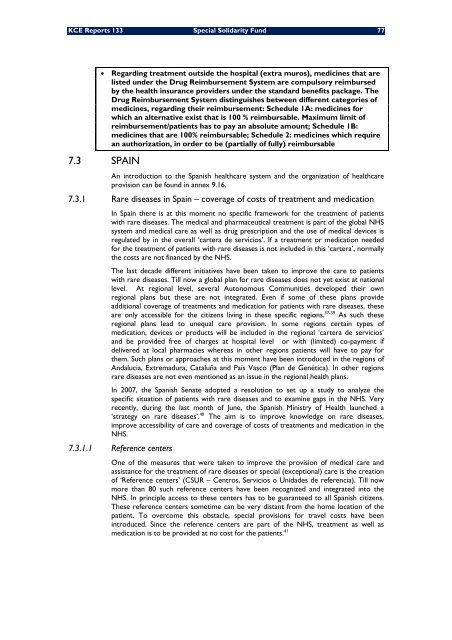Optimalisatie van de werkingsprocessen van het Bijzonder ... - KCE
Optimalisatie van de werkingsprocessen van het Bijzonder ... - KCE
Optimalisatie van de werkingsprocessen van het Bijzonder ... - KCE
You also want an ePaper? Increase the reach of your titles
YUMPU automatically turns print PDFs into web optimized ePapers that Google loves.
<strong>KCE</strong> Reports 133 Special Solidarity Fund 77<br />
• Regarding treatment outsi<strong>de</strong> the hospital (extra muros), medicines that are<br />
listed un<strong>de</strong>r the Drug Reimbursement System are compulsory reimbursed<br />
by the health insurance provi<strong>de</strong>rs un<strong>de</strong>r the standard benefits package. The<br />
Drug Reimbursement System distinguishes between different categories of<br />
medicines, regarding their reimbursement: Schedule 1A: medicines for<br />
which an alternative exist that is 100 % reimbursable. Maximum limit of<br />
reimbursement/patients has to pay an absolute amount; Schedule 1B:<br />
medicines that are 100% reimbursable; Schedule 2: medicines which require<br />
an authorization, in or<strong>de</strong>r to be (partially of fully) reimbursable<br />
7.3 SPAIN<br />
An introduction to the Spanish healthcare system and the organization of healthcare<br />
provision can be found in annex 9.16.<br />
7.3.1 Rare diseases in Spain – coverage of costs of treatment and medication<br />
In Spain there is at this moment no specific framework for the treatment of patients<br />
with rare diseases. The medical and pharmaceutical treatment is part of the global NHS<br />
system and medical care as well as drug prescription and the use of medical <strong>de</strong>vices is<br />
regulated by in the overall ‘cartera <strong>de</strong> servicios’. If a treatment or medication nee<strong>de</strong>d<br />
for the treatment of patients with rare diseases is not inclu<strong>de</strong>d in this ‘cartera’, normally<br />
the costs are not financed by the NHS.<br />
The last <strong>de</strong>ca<strong>de</strong> different initiatives have been taken to improve the care to patients<br />
with rare diseases. Till now a global plan for rare diseases does not yet exist at national<br />
level. At regional level, several Autonomous Communities <strong>de</strong>veloped their own<br />
regional plans but these are not integrated. Even if some of these plans provi<strong>de</strong><br />
additional coverage of treatments and medication for patients with rare diseases, these<br />
are only accessible for the citizens living in these specific regions. 37-39 As such these<br />
regional plans lead to unequal care provision. In some regions certain types of<br />
medication, <strong>de</strong>vices or products will be inclu<strong>de</strong>d in the regional ‘cartera <strong>de</strong> servicios’<br />
and be provi<strong>de</strong>d free of charges at hospital level or with (limited) co-payment if<br />
<strong>de</strong>livered at local pharmacies whereas in other regions patients will have to pay for<br />
them. Such plans or approaches at this moment have been introduced in the regions of<br />
Andalucia, Extremadura, Cataluña and País Vasco (Plan <strong>de</strong> Genética). In other regions<br />
rare diseases are not even mentioned as an issue in the regional health plans.<br />
In 2007, the Spanish Senate adopted a resolution to set up a study to analyze the<br />
specific situation of patients with rare diseases and to examine gaps in the NHS. Very<br />
recently, during the last month of June, the Spanish Ministry of Health launched a<br />
‘strategy on rare diseases’. 40 The aim is to improve knowledge on rare diseases,<br />
improve accessibility of care and coverage of costs of treatments and medication in the<br />
NHS.<br />
7.3.1.1 Reference centers<br />
One of the measures that were taken to improve the provision of medical care and<br />
assistance for the treatment of rare diseases or special (exceptional) care is the creation<br />
of ‘Reference centers’ (CSUR – Centros, Servicios o Unida<strong>de</strong>s <strong>de</strong> referencia). Till now<br />
more than 80 such reference centers have been recognized and integrated into the<br />
NHS. In principle access to these centers has to be guaranteed to all Spanish citizens.<br />
These reference centers sometime can be very distant from the home location of the<br />
patient. To overcome this obstacle, special provisions for travel costs have been<br />
introduced. Since the reference centers are part of the NHS, treatment as well as<br />
medication is to be provi<strong>de</strong>d at no cost for the patients. 41

















